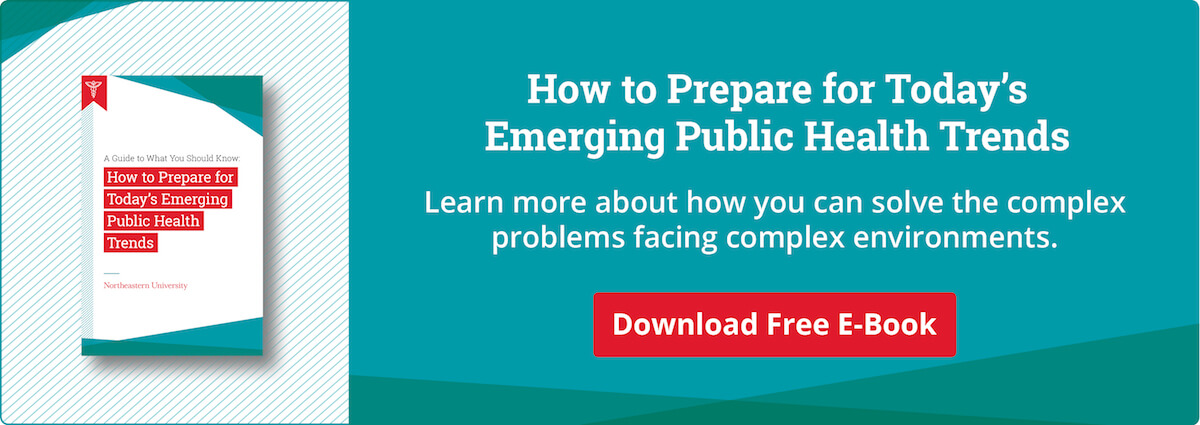The field of public health is a rapidly evolving, diverse field of opportunity with high demand for skilled professionals able to promote and protect the health of all communities. While there are a variety of career paths within public health—from roles as epidemiologists and registered nurses to dietitians, mental health counselors, and medical record technicians—one in particular touches on them all: public health researchers.
What does a public health researcher do?
A public health researcher is responsible for conducting surveys and analyzing data and lab results in order to gain a better perspective of a population’s health. They uncover trends, risks, and other factors, such as whether biology, behavior, society, or the environment play a role in a population’s health. Public health researchers compile this information for other public health professionals to help better serve a community through education programs, healthcare policies, and regulations.
The work that public health researchers perform is important for a number of reasons. For example, it can:
- Provide vital information about disease trends and risk factors
- Help to improve the use of drugs, vaccines, medical devices, and diagnostics
- Lead to the development of new drugs and therapies to improve public health
- Provide a better understanding of the disparities in healthcare
- Influence policy decisions at both the local and national level
One example of a public health researcher’s work involves the study of opioid addiction, says Gary Young, director of Northeastern University’s Center for Health Policy and Healthcare Research. This might include a collection of data—either through the development of a survey or through secondary data sets—then an analysis of the information to determine common trends, like whether addiction rates are increasing or decreasing, how they are distributed, and ultimately what can be done to reduce them. As a result of this analysis, a public health researcher may then implement an educational program or develop a new program to address the problem at hand.
Public health researchers study a variety of topics, which Young says makes this a particularly interesting field. Other topics they may research include:
- Vaccine distribution
- Disease transmission
- Substance abuse
- Disabilities
- Effectiveness of drugs and therapies
- Social determinants of health
- And more
- What skills do public health researchers need?
As public health researchers are involved in developing surveys, analyzing data sets, and reporting their findings, these professionals must have strong quantitative research, analytical, and writing skills, Young says. They also need an understanding of artificial intelligence and machine learning, which are becoming more widely used in the field.
Download Our Free Guide to Preparing for a Career in Public Health
Learn more about how you can solve the complex problems facing complex environments.
“Data is central to what these researchers do,” Young says. “They need to know what kind of data they need, and how to make sense of it.”
Alongside an ability to develop proposals, public health researchers need strong collaboration skills, as they often work in teams to develop new research methods. They also need to be comfortable public speaking in order to effectively present their findings to other public health professionals and to the public.
Where do public health researchers work?
Public health researchers have a variety of options for employment in both the public and private sectors. In the public sector, organizations like the Centers for Disease Control and Prevention (CDC), the National Institute of Health, and the World Health Organization all hire public health researchers. In the private sector, these professionals might work for consulting firms like John Snow, Lewin Group, Mathematica, Research Triangle, and RAND.
Did You Know: Public health researcher salaries vary and depend largely on experience, education, and the institution they work for. Public health researchers may earn an average of between $64,000 and $130,000 per year.
How to Become a Public Health Researcher
Enrolling in a Master of Public Health program is the first step to becoming a public health researcher. At Northeastern University, for example, the Master of Public Health is designed to meet the growing demand for public health professionals.
This program focuses on biostatistics in public health, environmental health, epidemiology, and public health administration and policy, with specific electives in research that include advanced methods in biostatistics, principles of population health, and qualitative methods in health and illness.
In addition to the coursework, students have the opportunity to apply skills acquired in the classroom directly to the public health field through experiential learning. Northeastern students in the past have completed their practicum in many different settings, including the:
- Boston Public Health Commission
- CDC
- Massachusetts Department of Public Health
- Massachusetts Joint Committee on Public Health
- Framingham Heart Study
According to Young, one element that distinguishes Northeastern’s Master of Public Health program from others is the faculty. The instructors that make up this program each come from teaching positions across Northeastern’s various colleges, bringing with them opportunities to address the various aspects of public health research from the perspective of each unique discipline.
What’s more, those teaching within the Master of Public Health program have real-world experience in the field.
“The university has faculty who work as consultants to a variety of organizations [and] who have connections in the field,” Young says. “We have faculty in the school of engineering and in our business school who are experts in public health. This provides [students with] a more robust network of opportunity. These connections are also important for internships and research opportunities, which often lead to career opportunities.”
Northeastern’s Master of Public Health program helps students obtain the necessary skills and experience to stand out in the field of public health research, he adds. “There are many different opportunities and pathways that students can take in this field,” he says. “It’s an exciting field to be a part of.”
If you’re interested in earning your Master of Public Health, visit Northeastern’s program page to learn more about how an MPH can advance your career. For more information on preparing for a career in public health, download our e-book.







Related Articles
4 Pressing Global Health Problems We Face Today
Global Health Careers: How Can I Make a Difference?
Compliance Specialists: Who They Are and What They Earn